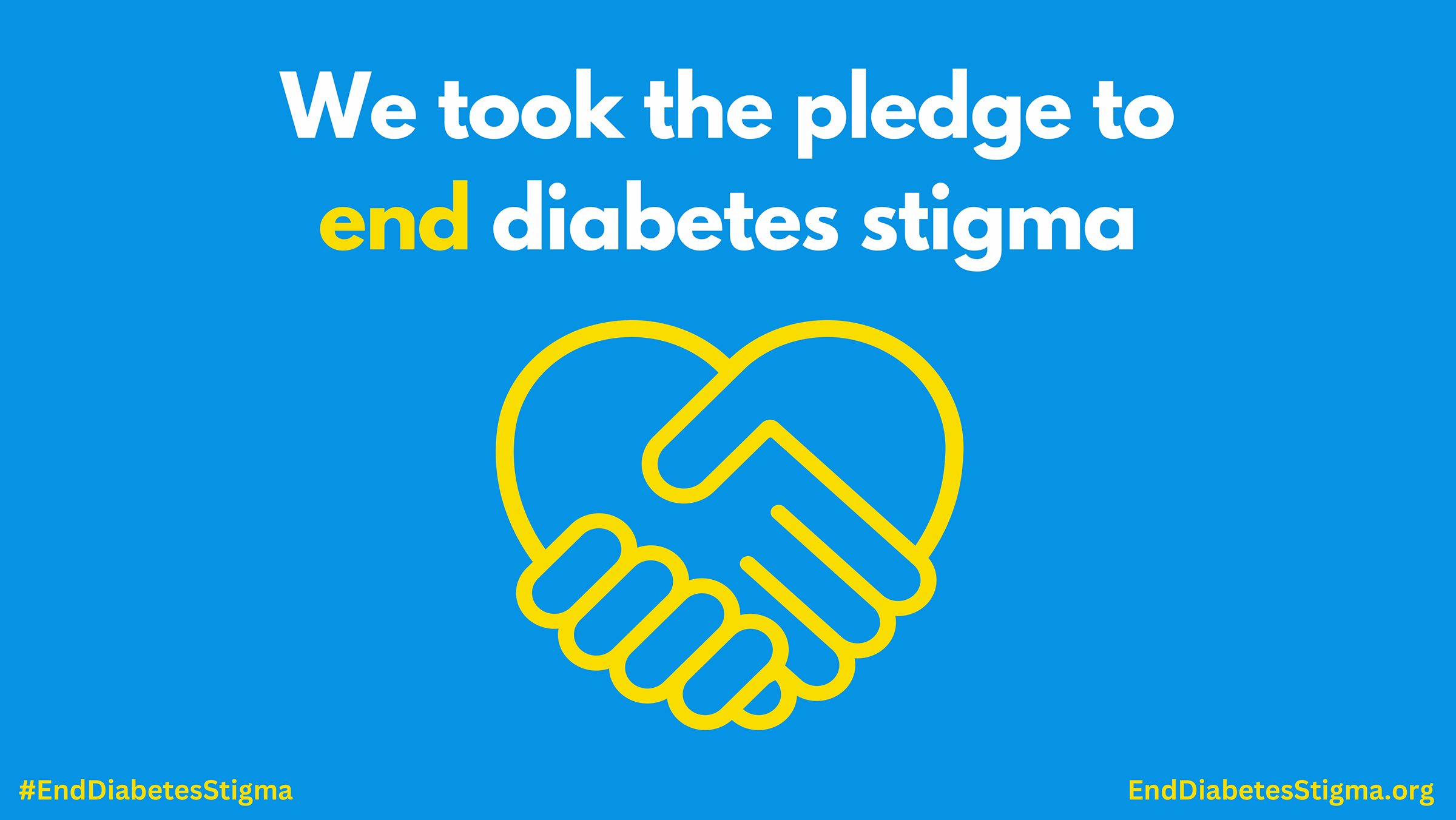DCB Newsletter #10/2023: Ending Diabetes Stigma?
Dear Community – We are happy to present to you the next episode of our series “DID YOU KNOW” in which we publish interesting facts about life with diabetes that you might not know yet. In this edition, we want to focus on stigma – or rather, on how we can work towards ending diabetes stigma. Enjoy the read!

“Did you eat too much sugar as a kid?”, “Should you really be eating that with diabetes?”, “Are you injecting drugs in public?” – These and similar questions often sound familiar to many people with diabetes, too often do they need to explain themselves and their condition to other people. In public media, diabetes is often depicted in a stigmatised way, fostering misconceptions and judgment in people who do not know much about life with diabetes. But also, people who should know – healthcare professionals and people in the diabetes community – are not exempt from exhibiting misconceptions and fostering stigma.
Most people with diabetes have experienced stigma
In psychology, stigma is defined as “the negative social attitude attached to a characteristic of an individual that may be regarded as a mental, physical, or social deficiency. A stigma implies social disapproval and can lead unfairly to discrimination against and exclusion of the individual.” [1] Thus, diabetes stigma in particular discriminates people based on their condition and can lead to blame, rejection, or exclusion due to the perceived stigmatisation.
Most people living with diabetes have experienced social stigma [2]. It can present itself in many ways and in different parts of their lives, whether it is in their private lives, in the medical field, at the workplace or in politics – and whether it is from outside or inside the community. It can be all-encompassing, from seemingly meaningless interactions with strangers in the street, to influencing political decisions and fostering systemic discrimination of those living with diabetes.
Efforts on ending diabetes stigma in the community
In the past years, there have been many efforts in the diabetes community to develop guides on how to minimise diabetes stigma, especially by reflecting on the language we use. The in-depth guides, reflecting the international #languagematters movement are available online. Most importantly, the use of active first-person language is recommended (“people living with diabetes” instead of “diabetics”) and judgmental language (e.g. “failing to have control”, “non-compliant”,…) should be avoided as to not reinforce negative stereotypes.
Life with diabetes is a 24/7 challenge and everyone is trying their best, so blame or judgment are not going to help anyone on their journey with diabetes – on the contrary, diabetes stigma is strongly related to psychological distress in people living with diabetes [3]. It has been shown to have negative effects on people’s mental and physical health, fostering diabetes distress and having negative impact on diabetes-related health outcomes such as Time in Range and HbA1c [4, 5]. It is crucial that diabetes stigma and the fight against it caption the attention of all of us – in medical treatment, product development, policy action and all interactions with all people living with diabetes.

What can we do to end diabetes stigma?
Recently, the “international consensus recommendations to bring an end to diabetes stigma and discrimination” were developed by a group of 51 experts around the world and a campaign for the pledge to end diabetes stigma was launched [6].
The pledge identifies different actions needed to end diabetes stigma and discrimination:
- “respecting people with all types of diabetes,
- recognising diabetes stigma exists and has harmful impacts,
- acknowledging and challenging my/our own prejudices about (people with) diabetes,
- using accurate, respectful, inclusive, non-judgmental, and strengths-based language, messaging, and imagery when communicating with or about people with diabetes,
- avoiding and challenging fear-based messaging and imagery,
- condemning discrimination due to diabetes and advocating for equal treatment and support for people with diabetes,
- encouraging initiatives, policies, and laws that promote equity for all people with diabetes.” [6]
Listening to those living with diabetes is crucial
To truly #EndDiabetesStigma, it is crucial that we listen to those living with diabetes and experiencing it firsthand. That is why we believe in user- and patient-centric research and product development. Together, we can pro-actively work on the language and imagery we use to reflect diabetes.
At DCB, we have happily endorsed the pledge and we invite you to do the same. Let’s end diabetes stigma together! You can endorse the pledge now as an individual or an organisation: https://enddiabetesstigma.org/
Thanks so much for reading and we’ll provide you with the next episode of this series soon!
Read more about the #languagematters movement and explore the international guides: https://www.languagemattersdiabetes.com/the-documents
[1] American Psychological Association. APA Dictionary of Psychology. American Psychological Association. https://dictionary.apa.org/stigma
[2] The Lancet Diabetes; Endocrinology. (2018). Diabetes stigma and discrimination: Finding the right words. The Lancet Diabetes; Endocrinology, 6(9), 673. https://doi.org/10.1016/s2213-8587(18)30235-3
[3] Guo, X., Wu, S., Tang, H., Li, Y., Dong, W., Lu, G., Liang, S., & Chen, C. (2023). The relationship between stigma and psychological distress among people with diabetes: A meta-analysis. BMC Psychology, 11(1). https://doi.org/10.1186/s40359-023-01292-2
[4] Hansen, U. M., Olesen, K., & Willaing, I. (2020). Diabetes stigma and its association with diabetes outcomes: A cross-sectional study of adults with type 1 diabetes. Scandinavian Journal of Public Health, 48(8), 855–861. https://doi.org/10.1177/1403494819862941
[5] Liu, N. F., Brown, A. S., Folias, A. E., Younge, M. F., Guzman, S. J., Close, K. L., & Wood, R. (2017). Stigma in people with type 1 or type 2 diabetes. Clinical Diabetes, 35(1), 27–34. https://doi.org/10.2337/cd16-0020
[6] End diabetes stigma and discrimination. https://enddiabetesstigma.org/
This post was previously published in Linkedin. Click here to see the original publication.
More recent news
DCB Newsletter #1/25: INSIDE DCB – Interview with Lisa Koch
Dear Community, We are thrilled to present you with the next episode of our series “INSIDE DCB” – this time, with an...
DCB Newsletter #5/24: INSIDE DCB – Our Milestones in 2024
Dear DCB community – as we approach the end of this year, we want to take the opportunity to look back on our team’s...
DCB Newsletter #4/24: IT’S A WRAP! A Recap of the 2024 DCB Open Innovation Challenge
Dear community – long time no see! At the height of Diabetes Awareness Month Novemver, we are happy to now provide you...


DCB Research AG
Freiburgstrasse 3
3010 Bern
Switzerland